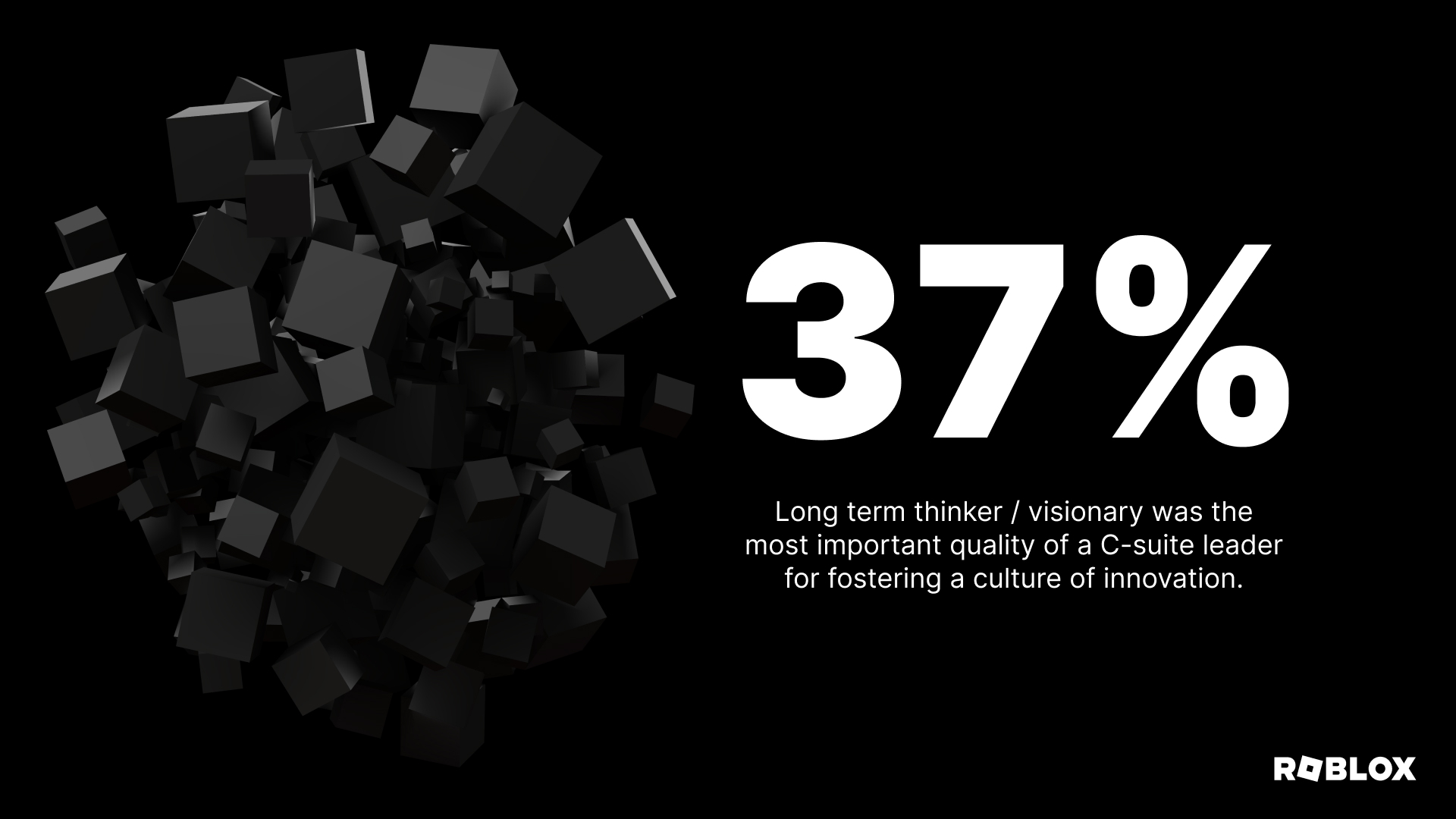Fostering a Culture of Innovation in 2023

Survey of engineers shows collaboration, flexibility and sense of ownership as critical factors in nurturing an innovation mindset and culture
When a company sets out on an ambitious goal of building things that haven’t existed before, innovation is that one significant differentiator between success and failure. Solving complex technical challenges requires a mindset that isn’t averse to taking risks, and a leadership style that is rooted in respect, collaboration, responsibility and a consistent long-term vision.
At Roblox, fostering a culture of innovation is top of mind for every leader. As we build the teams and hire the top technical talent to innovate and usher in our ambitious vision of a 3D immersive platform connecting a billion people, we wanted to hear directly from the broader engineering community on what leadership styles and skills they value most.
In a survey of 500 engineers across all career levels – from vice presidents and fellows, to directors, managers, principle engineers and other individual contributors – we covered topics related to leadership, technology, the future of work, and innovation. All in an effort to better understand the engineering mindset and get a clear picture of what’s important to them now and in the year(s) ahead.
We gathered some interesting insights, many of which are applicable to most engineering leaders and organizations. Today’s post focuses on results specific to leadership characteristics that foster a culture of innovation. Insights from the rest of our survey related to the engineering mindset, future of work and technology will follow in January.
Building an Innovation Friendly Culture
One important insight from our survey is that not doing something as a leader is at times more impactful to fostering a culture of innovation than anything else. For instance, competition is often seen as an important motivator and a driver of bigger, better results. Our survey shows that competition has the opposite effect on innovation.
According to our survey, engineers perceive competition as something that stifles innovation:
Encouraging competition ranks last (14%)¹ amongst important qualities for a C-suite leader to have for fostering a culture of innovation.
And, encouraging competition is seen in an even more negative light by early-in-their- career engineers and individual contributors (5%).
What really matters to engineers is for leaders to encourage an environment that is collaborative (91%), flexible (88%) and one that gives everyone a sense of ownership (87%). This aligns nicely to what many engineering leaders are already prioritizing, with collaboration (48%), a positive outlook (47%) and an initiative to learn new skills (46%) ranking as the top priorities by engineering leaders for fostering a culture of innovation.
However, the initiative to learn new skills shouldn’t just fall on the individual. Leaders should encourage ongoing education, and implement programs that empower engineers to learn new tools, programming languages, and skills. Our survey participants feel most innovative when learning new technical skills (61%), especially among those that are individual contributors (81%).
Priority Leadership Characteristics
When it comes down to evaluating C-suite leaders, engineers rank “long term thinker” or “visionary” as the most important quality (37%)¹ for fostering a culture of innovation. This area is significantly more important to individual contributors (53%) who look to be inspired by their C-suite leadership, than it is to other senior (VP+) leaders (33%).

Additional qualities that are top of mind for engineers across all career levels include trustworthiness (35%), taking responsibility (31%), and the ability to prioritize (31%). In contrast, lack of vision (43%), lack of development and growth opportunities (42%) and a poor employee culture (41%) are all listed as characteristics that stifle innovation.
Taking responsibility is one of our core values at Roblox, and that manifests itself through teams and individuals having the autonomy to explore projects and take risks. In particular, strategy proposals are expected to come from within the organization, with those teams then engaging in refining the strategy with senior management. We also create specific space in our schedule for innovation – such as through our annual Hack Week event.
A Look Ahead
Overall, these survey results are encouraging to me and our leadership team since we already work hard to encourage responsibility and many of the other characteristics that engineers feel are important for fostering innovation.
Innovation is that rare commodity that needs to be valued, rewarded and nurtured. At Roblox we aren’t standing still. As leaders, we’re already systematically thinking thorough ways to broaden, scale and give our teams the freedom to innovate so that they can bring our mission to life.
I hope that you find these insights valuable, and look forward to sharing more in the new year.
¹When selecting from a question that asks: Which of the following do you think are the most important qualities for a C-suite leader at your organization to have for them to foster a culture of innovation?
The post Fostering a Culture of Innovation in 2023 appeared first on Roblox Blog.




